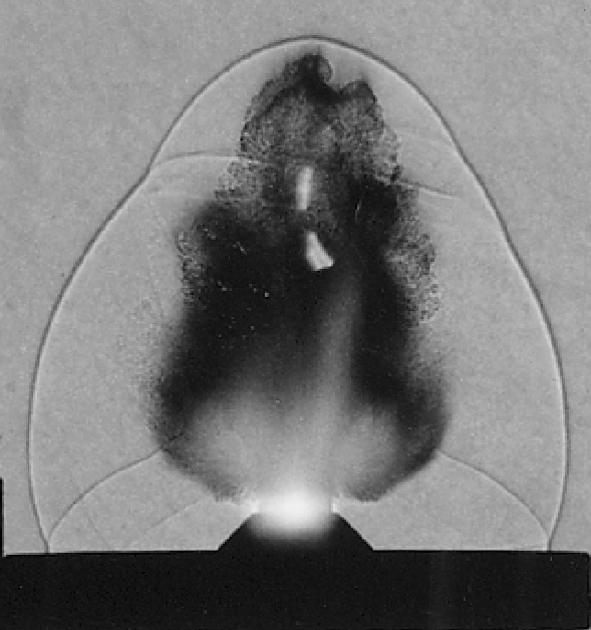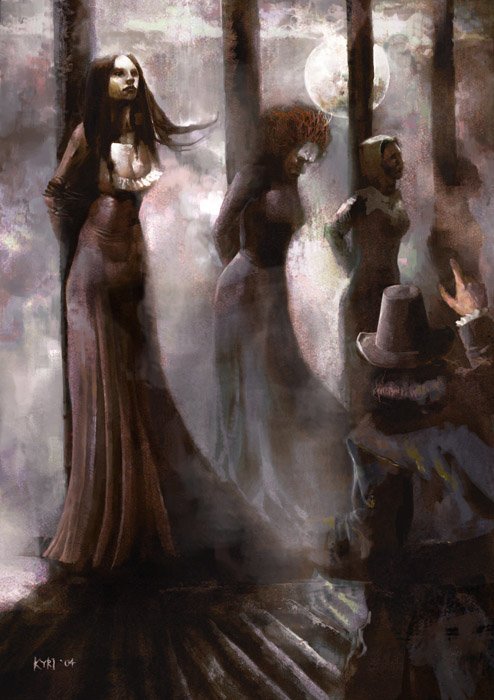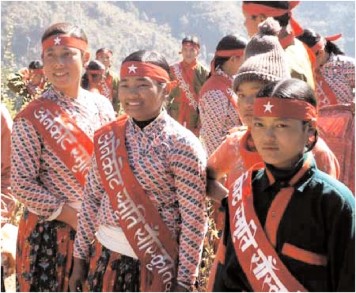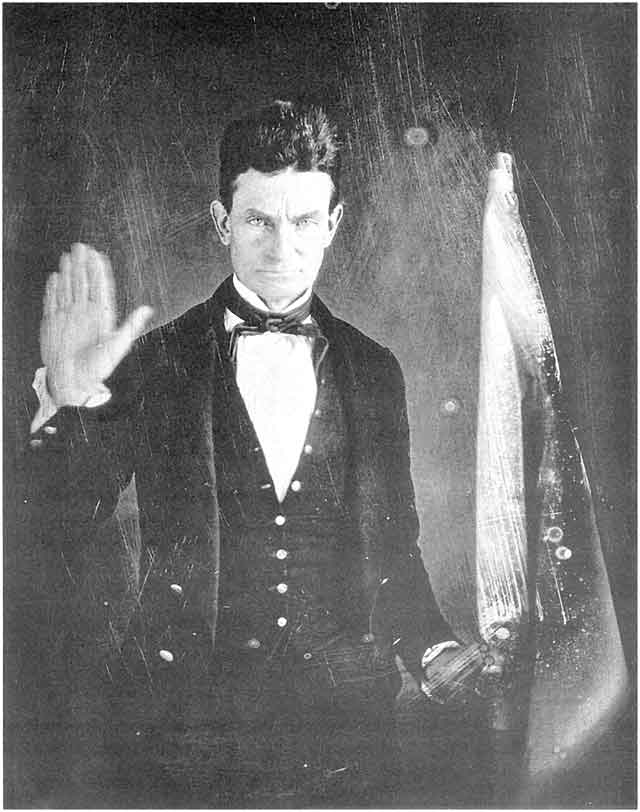
Armed communist guerrilla fighters waiting
Ka Frank posted a criticism of the new FIRE Collective pamphlet “A Revolution at the Brink: Stand With Nepal.” Here Nando replies to that criticism. We urge you to read Ka Frank’s remarks in detail.
* * * * * *
From Nando:
We agree on many things here. But let me for a moment focus on some disagreements:
I like the FIRE Collective’s headline “A Revolution at the Brink: Stand with Nepal.”
I think it corresponds with the approach we should take to building internationalist support, and (more to the point here) it represents a correct and dialectical appraisal about what is going on. (And it is not surprising that a short terse headline brings out disputes about what to say and promote.)
They are at the brink of a seizure of power. That doesn’t mean that they will go for it, or that they will win. But it does mean that (for the first time in decades) communist movement has brought the people within reach of countrywide power. It is a great accomplishment, and needs to be forcefully brought to everyone’s attention.
You write by contrast:
“It is more accurate to characterize the revolution in Nepal as being at a crossroads.”
I think this represents a misread of the situation. It takes a secondary aspect of the situation (the very real two-line struggle in the Nepali Maoist party) and treats it as the principal aspect. (I feel like you don’t think they do anything but fidget nervously and indecisively at this crossroads, much to your disapproval.)
Let’s put it another way: It is October 1917, and our pamphlet can read “Bolsheviks prepare a Communist Insurrection” or “Party Debates Power Grab Amid Deep Disagreements.” Aren’t they both accurate?
In fact, yes, the Nepali party is at a crossroads — which is inherent in every great revolutionary moment.
In fact, can’t you write that same headline about “crossroads” at any moment in their struggle? It actually doesn’t capture the SPECIFICITY of this moment or of their achievement. (This is not just ANY crossroad — it is the one at the brink of countrywide seizure of power… and of preparing all the difficult materials needed to launch and win such an attempt.)
Seeing Revisionist Default, Then Startled at Each New Move Toward the Revolution
Here is the essence of this:
You seem to feel that this Nepali Maoist party is deep in revisionism, with only occasional sputters of revolutionary impulse. Then when they again start talking in public about insurrection and new armed struggle you get excited and write:
“The new formulation of waging struggle from the government, the parliament and the streets points to such a shift to the Left.”
It is as if you have a negative pessimistic view of their intentions most of the time, as if you think their main leadership core is on the wrong road but under pressure. And then (over and over) when they don’t dissolve their army, or when they leave the government, or when they start talking about new upsurge of militant struggle…. whenever signs of revolutionary advance become visible you excitedly think this is “such a shift to the left.” (i.e. it is a shift from the revisionist default that you seem to see.)
And you have an elaborate analysis that Prachanda had the revisionist plan (of not going for Peoples Democracy) but (under pressure) reached (yet another) compromise. And so on.
Speaking for myself, I have read the same articles, and don’t pretend to know the full picture of what Prachanda thinks (in private). A party leader (as I know from experience in the RCP) is both a point-person for a line, and also a unifying figure. They often can’t (and don’t) say what they are actually fighting for at each point of the inner party struggle –while they unleash those forces who do fight sharply for a particular program. There are wings in this party, and I imagine that Prachanda is a unifying figure in many ways. But I don’t assume that their compromises are all “foul compromises.”
There is a climate among some communists that assumes that all compromises are inherently evidence of lack of clarity on principles. With that approach, we will never organize anything with anybody. Politics is not the simple application of simple self-evident principles (from which compromise can only mean a departure). Politics requires the creation of allignments and programs in a dynamic matrix of events.
Look at what this party has done:
They launched a peoples war, they waged it successfully, they agreed to enter a political offensive (from 2006 til now), they won over remarkable political support, they have deeply “compared and contrasted” the three opposing roads (monarchism, bourgeois democracy and peoples democracy) before the eyes of millions of awakening people, they have withdrawn from the government, and they are now preparing to launch a new test of mass strength through open struggles (perhaps in preparation for insurrection.)
Why do you keep portraying them as lost and aimless in the same old crossroads?
Don’t you see all the progress through VARIOUS crossroads?
I think they might seize power and embark on their idiosyncratic version of socialism, and some would STILL be grumbling that they are still stuck at that crossroads, and haven’t yet made things clear the metaphysical way some think they must be made clear.
Approaching a Real Seizure of Power: Timing, Forces, Conjuncture, Unity, Tactics & the Element of Surprise
To win a revolution, the Nepali communists need to seize overall power. I believe that, you believe that, and I assume they believe that.
But there are sharp materialist questions of assessment. As a negative example, the RCP’s Bob Avakian implies that the Nepalis have suffered a loss of “strategic will.” i.e. he sums up that the core problem here is that they have lost their nerve in the face of the dangers. Well, that’s easy for him to say.
But in fact there are material problems: they face a very real army, that they can either defeat or not. They tried it, and pulled back in 2006 based on their assessments then. They also now face mobilizing the population, specifically for a great revolutionary effort and for all the sacrifice that follows — which diverse sections of the population will either embrace or not.
And there are issues of program: seize power for what? What is the state, government and military situation that defines the victory?
A thought: There are forces in the Nepali party who argue that the transitional period should last a while longer. Why do they do that? Is it simply that they don’t appreciate or desire Peoples Democracy? Is it possible that their assessment is that a move from the current unstable bourgeois democracy (coexisting uneasily with a monarchist army) can’t be replaced by peoples democracy (at this particular moment)? There may be some forces who think it is unlikely that a poor landlocked country like Nepal can aspire to a socialist road for the forseeable future. And it is also possible that other forces think the socialist road is possible, but the insurrection is not yet ripe. These are questions to consider when trying to evaluate “the crossroads” of this party.
In other words, revolutionary timing is not just a matter of will or desire.
To make an actual insurrection you need to count noses, you need (as Lenin said) to launch from a high tide of popular indignation and effort. You need your core social base prepared and eager to take on this new challenge (which they aren’t always prepared or eager for!) And you need a programmatic plan that applies in this particular situation, the will of the revolutionary people, and also serves as a bridge onwards to socialism.
You can’t just pick a day and go — without specific prerequisites in place. I suggest people study the experiences of the German attempts of 1923 etc. which were treated precisely as just matters of will. In Germany the Comintern ordered the KPD to pick a day and launch an uprising. Their advanced forces went into motion, but without mass support. And they were crushed. History is full of shattered movements that thought they could just run on will.
And (of course) the objective difficulties also do fuel backward, capitulationist lines (that tend to exaggerate the desirability and stability of bourgeois democracy.)
But in Nepal, it is not a matter of “better insurrection now than later, better tomorrow than next week.” It may very well be that the Maoists objectively can’t seize power right now… and need to buy time and gain forces (”hasten and await”). It’s not like we can say “they postponed insurrection, that’s a bad sign” or “They are rushing the insurrection, they must now have a better line.” It may be that postponing an insurrection is correct, for very real material reasons — or they may be able to launch and win one soon. I don’t know, and I don’t know how you can know from afar. This is no game.
In Weimar Germany (1919-1933) the German Communist Party never GOT the prerequisites for an insurrection. They had millions of supporters, they had an intense economic and political crisis. But the elements never came together. Perhaps they could have done some things better, perhaps that might have created an opening. But the fact is that it is not a given that you CAN launch an insurrection when you want one. It is not even a given that you will have one next year. And being impatient, assuming that caution is evidence of betrayal, is really often infantile. Again: go read about 1923. It is sobering.
But again: The Nepali Maoists are farther along than anyone would have expected. They have an army (which the KPD DIDN’T have), they now have experience in local and national power, they have had two years to train their military and political cadre in the skills of government, they have won over new sections of the people… So maybe they will get a chance! The fact that this is possible makes our internationalist work urgent.
I think the plan of the Nepali party was all along was to gather necessary forces, carry out countrywide seizure of power and establish a peoples democracy as a basis for the socialist road. I think the 2006 negotiations were a substage toward that (not a confused flirtation with capitulation). Unlike some people I don’t think they ever gave up the road of armed revolution, or intended to dissolve their army, or abandon New Democracy and Socialism. AND i think the evidence has (so far!) confirmed that view (and that is perhaps one of the areas of disagreement, and an area for further exploration).
There were forces inside their party urging caution and going slow (as there inevitably are). I think there have been rightist winds in their party (as there often are in serious parties). I think new people entering their party and some of their leading people flirted with extending the “transition” indefinitely (in a way that would have meant embracing bourgeois democracy instead of peoples democracy).
But in fact, the existence of bourgeois headquarters was inherent in leading a revolution at a countrywide level. And it was persistent through the preparation, the carrying out, the victory and the aftermath of that revolution. It’s no like the Maoists were ever NOT at a crossroads, or that they had to resolve their two line struggle in some metaphysical way (purges? no compromises?) to make any possible advance. No, that assumption would be dogmatic orthodoxy (similar to Hoxha’s some of views) not Maoism.
The revolution does need to advance… and it does need to do that amid great debates and ongoing internal struggles — that will reach temporary resolution over specific decisions and plans, but which will continue for the life of the party.
What Are We Trying to do From Here?
It is not like our main task (internationally) is constantly to announce and publicize about the existence of this two line struggle. Should our pamphlets and teach-ins sound like some news wire of micro-debates in Nepal — all presented in a fretful air of distrust and disappointment?
Yes two line-struggle exists. Yes its outcome will determine whether this revolution passes OVER THE BRINK to an actual seizure of countrywide power. Yes our audiences need to know about the substantive issues a revolution faces, and the ways THIS revolution has chosen to debate and resolve them.
Put another way: The phrase “Revolution at the Brink” views the main contradiction as being between the revolution and the old society. The slogan “Revolution at the crossroads” presents the main contradiction as being between revolution and capitulation within the party. Both of those contradictions are very real. They are intensely intertwined.
But our approach to these matters is shaped by our task here: which is building support for a LIVING revolution. What people need to know (especially in a popular pamphlet) is that this revolutionary force has been built, that it has creatively made its way to this point, that it has a vision for the future, that it deserves our active political support, that people need to break the media whiteout, that the Maobadi are not “terrorists” etc. We should not hide the fact that revolutions have internal debates, of course. We should mention it, and we should (when appropriate and possible) help our audiences know what the lines are.
But the task of internationalists is not to produce a day-by-day press service about the health of revisionism in the Nepali communist movement, and that frets daily over whether we think “the good guys” are gaining ground in their debates.
The task of internationalists is to build real support and excitement over this revolution AND train new forces in a scientific view of what a revolution is (including an understanding of the inevitability and decisiveness of line struggle). We should bring out the controversies (and we have on Kasama from the beginning). The key thing here is to actively build support for this revolution’s very real accomplishments and real potential. We should not be naive “cheer-leaders” training others in self-deception and mythic triumphalism. But we should build some much-deserved support and display some much deserved enthusiasm.
 A collision has been building for months — since the Nepali military refused to accept civilian control and restructure along the lines ordered by the Maoist-dominated government. Since then the Maosts resigned from national office and regrouped in a series of strategic meetings. They have called for public actions — suggesting that this might build to the kind of storm that toppled the King a few years ago. The word insurrection has been mentioned.
A collision has been building for months — since the Nepali military refused to accept civilian control and restructure along the lines ordered by the Maoist-dominated government. Since then the Maosts resigned from national office and regrouped in a series of strategic meetings. They have called for public actions — suggesting that this might build to the kind of storm that toppled the King a few years ago. The word insurrection has been mentioned.




















